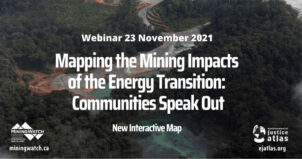
On the heels of COP-26, where global leaders agreed to make unprecedented investments in the energy transition, frontline communities already in the crosshairs of mining for critical minerals warn of the dangers posed by the mining boom for ‘green tech.’
The 23 of November, the Environmental Justice Altas and MiningWatch Canada launch a new interactive map and report that documents widespread social and environmental impacts of mining for lithium, copper, nickel, and graphite in the Americas.
The report highlights the realities of mining-affected communities from nine countries of the Americas — Argentina, Chile, Bolivia, Peru, Ecuador, Panama, Mexico, USA, and Canada.
Through the analysis of 25 cases, the report documents how the Canadian and global mining industry has quickly positioned itself as the solution to the climate crisis, with companies and countries alike jockeying to provide the three billion tons of metals and minerals that some estimates say will be required over the next 30 years to power the energy transition. Over 60% of global mining companies are registered in Canada.
This ‘green mining boom’ increasingly affects human rights, Indigenous rights, and the environment. Mining is already rapidly expanding into fragile and biodiverse ecosystems like the Amazon and other rainforests, glacial areas, salt flats, mountain ranges, and wetlands — areas often of vital importance in providing fresh water, sustaining life, and regulating the climate.
Frontline communities, academics, and activists say that an energy transition that depends on massive mining of new materials without considering for what, for whom, and at what socio-environmental costs, will only reinforce the injustices and unsustainable practices that are already part of the climate crisis itself.
Background materials:
· Executive summary in English, French and Spanish
· A report detailing key findings in Spanish
Quotes:
“Batteries and electric vehicles cannot be ‘green’ if they are built on the backs of communities that see their environment destroyed by toxic waste and industrial scale open pit mines. Ecotourism and outdoor recreational activities are major local and sustainable economies that should be protected, not undermined.”
– May Dagher, Citizen Coalition Opposed to Nouveau Monde Graphite’s project in the Lake Taureau Regional Park watershed, Quebec, Canada
“Mining is one thing, but disregarding our rich Culture to mine for the rich means the absolute disrespect of everything we knew of. In our ancestors’ day it was the Railroads and train tracks, today it’s mining for lithium. Starting with the desecration of Sacred Sites.”
– Gary McKinney, Western Shoshone-Northern Paiute Nation, member of the Northeastern Nevada People of Red Mountain affected by Lithium Americas’ Thacker Pass project
“The so-called ‘sustainable copper’ promoted by Los Andes Copper will be mined at the cost of transforming a valley, its community, and its ecosystem into a sacrifice zone. It’s not just one company. It’s the whole model of resource extraction.”
– Sara Gómez Honores, Spokesperson, Putaendo Resiste, about Los Andes Copper’s Vizcachitas mining project in Chile
“The planet needs to consume cleaner energy. But why does it have to come at the cost of sacrificing fragile ecosystems and regions of the planet? Right on our land?”
– Clemente Flores, Spokesperson of the Indigenous community of El Angosto, Spokesperson of the Indigenous Peoples’ Round Table for the Protection of the Lake of Guayatayoc and Salinas Grandes Basin in Argentina (from the documentary, ‘In the name of lithium.’)
“Nearly 20% of the 3550 socio-environmental conflicts documented in the Environmental Justice Atlas are connected to mining. This is the most contentious activity mapped to date. An energy transition based on mining will only expand and intensify these conflicts, both in the global North and South.”
– Dr. Mariana Walter, researcher at the Institute for Environmental Science and Technology at the University of Barcelona (ICTA-UAB) and the Environmental Justice Atlas
“We need to think critically about what this energy transition model means for fragile ecosystems and the people who depend on them. There are communities across the Americas pushing back against this capitalist extractivist model.”
– Viviana Herrera Vargas, Interim Latin America Program Coordinator, MiningWatch Canada
“A Just Transition means reducing the material footprint of our societies through solutions that are both low in carbon and low in minerals. With nearly 60% of global mining companies registered in Canada, we have a great deal of responsibility on these issues.”
– Ugo Lapointe, Canada Program Coordinator, MiningWatch Canada

The project ENVJUSTICE has received funding from the European Research Council (ERC) under the European Union’s Horizon 2020 research and innovation programme (grant agreement No. 695446)